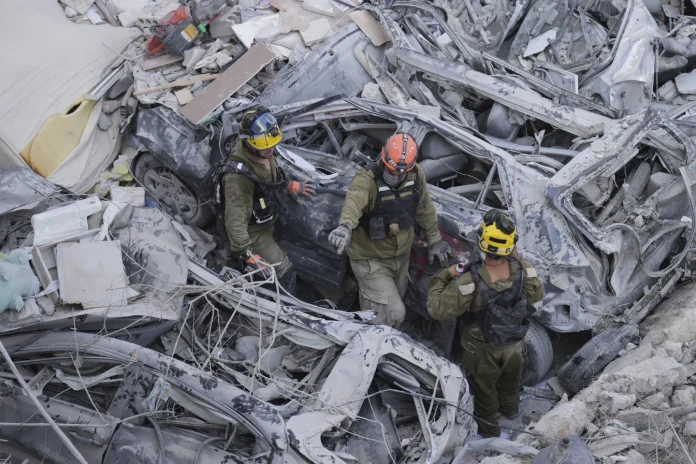– Mohammed Talha Siddi Bapa
On the fourth day of relentless conflict between Iran and Israel, the war has entered a new and dangerous phase: missiles now rain down in broad daylight, striking populated cities as civilians bear the cost of decisions made in fortified war rooms. As the G7 Summit opens in Canada today, the Iran-Israel confrontation demands urgent and unified global attention – not just as a geopolitical crisis, but as a full-blown humanitarian catastrophe and a threat to regional stability.
From Night Strikes to Daylight Destruction
What began as retaliatory strikes has evolved into open warfare. On Monday, Iran launched daylight missile attacks on Israeli cities – a departure from earlier nocturnal strikes meant to minimise escalation. Cities including Tel Aviv, Bat Yam, Haifa, and Rehovot were hit, with at least 10 civilians killed and more than 180 injured, including children.
Israel responded with full force, targeting Tehran, Mashhad, and oil storage facilities, setting fuel depots ablaze. Iranian officials claim 224 deaths, 90% reported as civilians, with hospitals overwhelmed and entire neighborhoods blackened by fire and smoke.
G7 Must Lead with Diplomacy, Not Deference
The conflict now casts a heavy shadow over the G7 Summit in Ottawa, where leaders including U.S. President Donald Trump, UK Prime Minister Keir Starmer, and German Chancellor Friedrich Merz had convened for what was initially a climate-focused agenda. That must change.
The G7 must immediately pivot to prioritising a ceasefire, enforced by coordinated diplomatic pressure and robust humanitarian access. Indifference is no longer a neutral stance – it is complicity. The choice is no longer between sides, but between escalation and survival for millions.
Don’t Forget Gaza: A Crisis Pushed to the Margins
While global focus shifts to missile exchanges between Iran and Israel, the catastrophic situation in Gaza has quietly slipped out of the headlines. Yet the humanitarian crisis there remains urgent.
In Cairo, Alexandria, Amman, and other capitals, massive protests have erupted in solidarity with Gaza. In Egypt, thousands are marching toward the Rafah border crossing, demanding it be opened for humanitarian aid and the evacuation of civilians.
Washington’s Role: From Ally to Active Enabler
Far from exercising restraint, the United States under President Donald Trump has become a key enabler of this war. Israel has openly requested Washington’s support for heavy military assets – including bunker-buster bombs, B‑52 bombers, and satellite-guided targeting systems to destroy Iranian nuclear infrastructure.
This is no longer covert diplomacy. It is public war coordination.
The Trump administration has reportedly approved several critical components of these requests. While a proposal to target Iran’s Supreme Leader was vetoed, the broader military alliance is fully active. The U.S. is not merely supporting Israel – it is strategically empowering its offensive campaign.
Iran Refuses Ceasefire Under Fire
Efforts to negotiate a ceasefire – mediated through Oman and Qatar – have failed. Iranian officials insist they will not enter talks while their cities are under bombardment. Any meaningful dialogue, they argue, must follow a halt to Israeli attacks.
A Fragile Region on the Brink
The regional impact is already unfolding:
– Brent crude oil prices have climbed by 1.5%, though markets remain cautiously stable
– Commercial airspace across the Gulf is being diverted
– Refugee flows have begun toward Iraq and Armenia
– Militias in Lebanon, Syria, and Iraq are repositioning for potential engagement
Editorial View: Don’t Feed the Fire
The G7 must act decisively. This is not the time for rhetorical condemnations or diplomatic hedging. It is the time for firm mediation, humanitarian intervention, and de-escalation.
There is no justification for more death – not in Haifa, not in Tehran, not in Gaza.
The United States is not a bystander. It has openly aligned itself with Israel’s war strategy, offering weapons, intelligence, and political cover. What is needed now is firm opposition from G7 partners, an international demand for a ceasefire, and unrestricted humanitarian access.
If the G7 fails to confront this reality, it risks irrelevance – and worse, complicity.
The world does not need more explosions. It needs the courage to make diplomacy louder than missiles.




